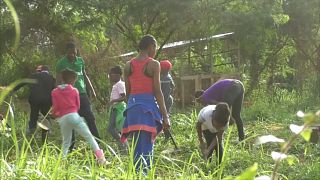Uganda
The sight of larvae might not be for everyone, but 30-year-old Scovia Namataka does not mind the wiggling maggots.
She feeds them natural waste, like mango and jackfruit leftovers. In return, they help her garden — and her household income.
"I get the five days larvae. I put them in my drums, they spend there for only two weeks, they come and take the mature larvae and they give me some little money for it, I remain with my natural manure", said Ugandan farmer Scovia Namataka.
These money-making maggots come from Marula Proteen Hub, some 70 kilometres from Kampala, where teams rear the Black Soldier Fly - and distribute the larvae to farmers.
Clean, eco-friendly and easy to keep, all they need is a warm environment, some water and a place to lay eggs.
Once the larvae are five days old, they are sold to farmers who keep them for a fortnight and get fertiliser from the excrement or "frass".
With fertiliser prices more than doubling in the region in the past year, it’s a greener and cheaper alternative for local farmers.
"The war in Russia and Ukraine made the other chemical fertilisers, which were imported, so expensive that the prices have hiked up. We couldn’t manage buying those chemical fertilisers. And secondly, they are harmful to the soils", explained smallholder, Peter Wakisi.
Peter Wakisi is a network technician and small hold farmer. He made the change to natural fertilisers five months ago.
Today, he uses the money he saved for his pig farming project.
As for the larvae, the hub buys the mature maggots back from farmers like Peter for double the selling price.
"We transport young larvae back to the production hub, but as it sits at the production hub, we have a set of clients that are interested in it. Reason being it is a source of protein for animal feeds, so you find the people that are dealing in pig farming, fish farming and also poultry and use it to enhance protein levels of their feeds", said William Kafuko, special project manager and administrator at Marula Proteen Hub.
The Marula Proteen Hub started the program 18 months ago. Today, it employs over 100 people and helps more than 1,200 farmers.
The project hopes to tackle high unemployment among young Ugandans in the long run and increase food production in a country where over 70% of the population still work in agriculture.










11:19
Cocoa is under pressure while East African economy is on the rise {Business Africa}
01:00
Pix of the Day: July 16, 2025
02:11
Witchcraft and politics: Uganda’s election season sparks supernatural surge
02:30
Morocco’s oases struggle to survive amid growing desertification
01:13
Uganda reopens border with M23-held eastern DRC
01:45
Empowering youth in agriculture could boost global economy, FAO report says